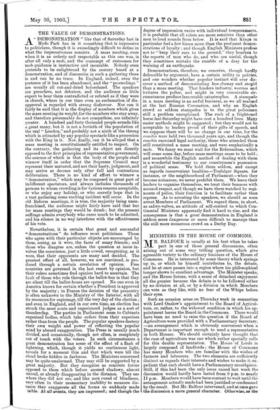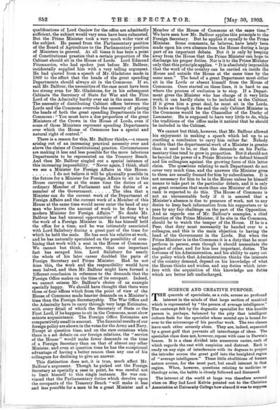MINISTERS IN THE HOUSE OF COMMONS.
MR. BALFOUR is usually at his best when he takes part in one of those general discussions, often arising out of some very trifling question, which give agreeable variety to the ordinary business of the House of Commons. He is interested by some theory which springs up in, or which he himself contributes to, the debate, and he at once passes into a region where his philosophical temper shows to excellent advantage. The Minister speaks, and the House listens, with a sense of detached enjoyment all the greater because the debate is to be followed either by no division at all, or by a division in which Members can vote as they like, with no fear of the Whips before their eyes.
Such an occasion arose on Thursday week in connection with Lord Onslow's appointment to the Board of Agricul- ture, or, rather, to the widowed condition in which his ap- pointment leaves the Board in the Commons. There would have been no need to raise the question if the Board of Agriculture were provided with a Parliamentary Secretary, —an arrangement which is obviously convenient when a Department is important enough to need a representative in both Houses. We should certainly have thought that the case of agriculture was one which rather specially calls for this double representation. The House of Lords is largely composed of landlords ; the House of Commons has many Members who are familiar with the wishes of farmers and labourers. The two elements are sufficiently distinct as regards their interests and wishes to make it ex- pedient that each should have a Parliamentary mouthpiece. Still, if this had been the only issue raised last week the discussion would hardly have lasted from 9 p.m. to nearly 11 p.m. Members would have been content to wait until the arrangement actually made had been justified or condemned by the result. But Mr. Balfour intervened, and at once gave the discussion a, more general character. Otherwise, as the qualifications of Lord Onslow for the office are admittedly sufficient, the subject would very soon have been exhausted. But the. Prime Minister took a very much wider view of the subject. He passed from the Parliamentary position of the Board of Agriculture to the Parliamentary position of Ministers in general. At all times it has been a point of Constitutional practice that a certain proportion of the Cabinet should sit in the House of Lords. Lord Edmund Fitzmaurice, who had spoken just before Mr. Balfour, incidentally supplied him with a very telling argument. He had quoted from a speech of Mr. Gladstone made in 1869 to the effect that the heads of the great spending Departments should always sit in the Commons. If so, said Mr. Balfour, the necessities of the case must have been too strong even for Mr. Gladstone, for in his subsequent Cabinets the Secretary of State for War and the First Lord of the Admiralty hardly ever sat in the same House. The necessity of distributing Cabinet offices between the Lords and the Commons overrode the necessity of placing the heads of both the great spending Departments in the Commons : " You must have a due proportion of the great Ministers of the Crown in the House of Lords, even if some of those Ministers represent spending Departments over which the House of Commons has a special and natural right of control."
There is a reason for this, Mr. Balfour thinks,—a reason arising out of an increasing practical necessity over and above the claims of Constitutional practice. Circumstances are making it less and less possible for the more laborious Departments to be represented on the Treasury Bench. And then Mr. Balfour singled out a special instance of this increasing impossibility. " Never again, I think, shall we see a Minister for Foreign Affairs in this House.
I do not believe it will be physically possible in the future for a Minister for Foreign Affairs to sit in this House carrying on at the same time the duties of an ordinary Member of Parliament and the duties of a member of the Government The idea that a Minister can do the current work of the Department of Foreign Affairs and the current work of a Member of this House at the same time would never enter the head of any man who knows the amount of work to be done by a modern Minister for Foreign Affairs." No doubt Mr. Balfour has had unusual opportunities of knowing what the work of a Foreign Minister is. He has himself held the office for a time, and he was intimately associated with Lord Salisbury during a great part of the time for which he held the seals. He has seen his relative at work, and he has naturally speculated on the possibility of com- bining that work with a seat in the House of Commons. We cannot but think, however, that one important fact has escaped him. Lord Salisbury for nearly the whole of his later career doubled the parts of Foreign Secretary and Prime Minister. Had he not ione this, the work and the responsibility would have oeen halved, and then Mr. Balfour might have formed a Efferent conclusion in reference to the demands that the Foreign Office makes on the time of its occupant. Indeed, we cannot esteem Mr. Balfour's choice of an example specially happy. We should have thought that there were three or four offices which from the point of view of the House of Commons made heavier demands on a Minister's time than the Foreign Secretaryship. The War Office and the Admiralty have to carry through very large Estimates, with every detail of which the Secretary of State or the First Lord, if he happens to sit in the Commons, must show minute acquaintance. The Foreign Office Estimates are comparatively small in amount. The financial results of our foreign policy are shown in the votes for the Army and Navy. Except at question time, and on the rare occasions when there is a set debate on our foreign relations, the " service of the House " would make fewer demands on the time of a Foreign Secretary than on that of almost any other Minister, and even at question time he has the exceptional advantage of having a better reason than any one of his colleagues for declining to give an answer.
This distinction does not, it is true, much affect Mr. Balfour's argument. Though he picked out the Foreign Secretary as specially a case in point, he was careful not to limit himself to this single instance. He was con- vinced that the Parliamentary duties which devolve upon the occupants of the Treasury Bench " will make it less and less possible for a man to be a great Minister and a Member of the House of Commons at the same time." We have seen how Mr. Balfour applies this principle to the Foreign Secretary. But he applies it equally to the Prime Minister. Some comments, he believes, have lately been made upon his own absence from the House during a large part of an important debate. But it is only by keeping away from the House that the Prime Minister can hope to discharge his proper duties. Nor is it to the Prime Minister only that this principle applies. " It is absolutely impossible that the work of the country can he carried on inside the House and outside the House at the same time by the same man." The head of a great Department must either sit in the Lords or absent himself from the House of Commons. Once started on these lines, it is hard to see where the process of exclusion is to stop. If a Depart- ment gives the Minister who has charge of it very little work, it can hardly claim to be included in the Cabinet. If it gives him a great deal, he must sit in the Lords. It looks as though in the end the only Cabinet Minister in the Commons would be the Chancellor of the Duchy of Lancaster. He is supposed to have very little to do, while the traditions of the office make it natural that he should be included in the Cabinet.
We cannot but think, however, that Mr. Balfour allowed his enjoyment in making a speech which led up to so startling a conclusion to carry him rather far. Nobody doubts that the departmental work of a Minister is greater than it used to be, or that the demands on his Parlia- mentary time tend to grow in proportion. But it should not be beyond the power of a Prime Minister to defend himself and his colleagues against the growing force of this latter claim. The questions relating to each Department do not cover very much time, and the answers the Minister gives to them are usually framed for him by subordinates. It is not necessary for him to be in the House unless he himself means to take part in the particular debate, and it is only on great occasions that more than one Minister of the first rank is expected to do this. The House of Commons is not an unreasonable body if it is assured that a Minister's absence is due to pressure of work, not to any desire to keep back information from his supporters or to pass by any fair challenge on the part of the Opposition. And as regards one of Mr. Balfour's examples, a chief function of the Prime Minister, if he sits in the Commons, should be to watch the temper of the House. If he is a Peer, that duty must necessarily be handed over to a colleague, and this is the main objection to having the head of the Government in the Lords. But when the Prime Minister is in the Commons it is a duty that he must perform in person, even though it should necessitate the neglect of other, and for him less important, duties. The fortunes of his Administration, and his ability to carry out the policy which that Administration thinks the interests of the country demand, depend on his knowledge of what the House thinks and wishes, and any duties which inter- fere with the acquisition of this knowledge are duties which are better left undischarged.







































 Previous page
Previous page